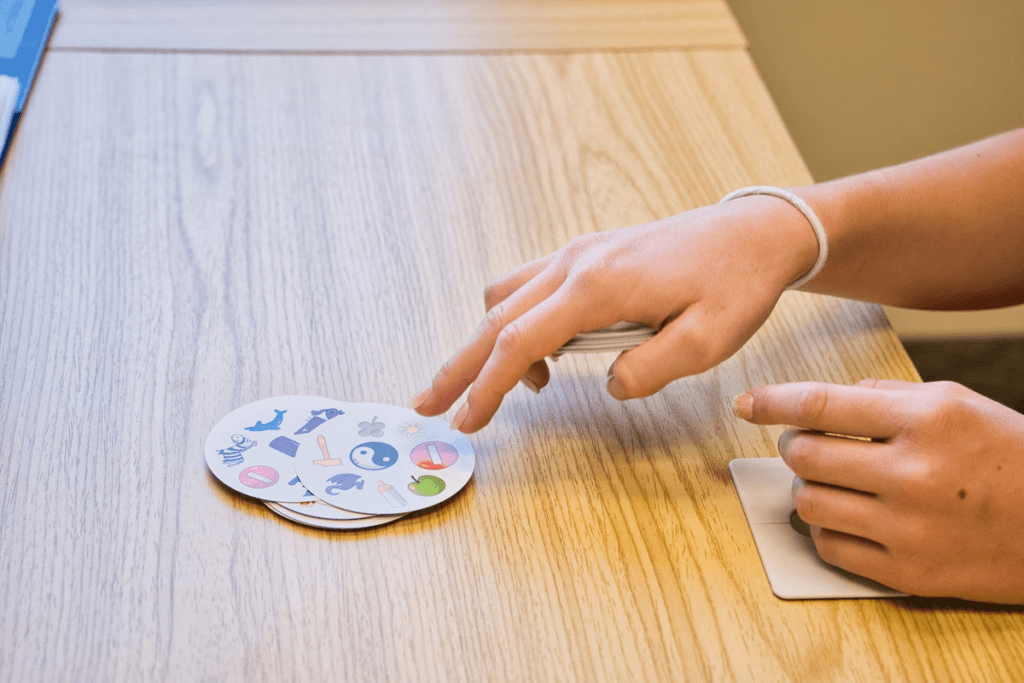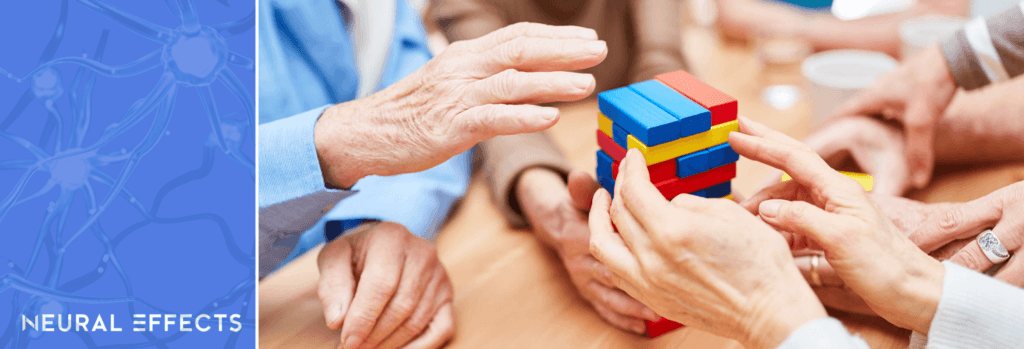While there is no cure for dementia, some patients turn to medications to help slow cognitive decline and address a variety of symptoms of dementia, such as depression, sleep difficulties, and agitation. While these meds don’t make Alzheimer’s disease and other types of dementia go away, they might improve quality of life and help patients maintain independence for as long as possible.
But there are many valid reasons you might decide to pursue alternatives to dementia medication. One of the main problems with medication is that these drugs don’t work for all patients. For example, cholinesterase inhibitors (which help nerve cells communicate better with each other) only benefit some patients, but not others. Unfortunately, doctors can’t predict whether these meds will help you without you trying them. Even if they do work, the benefits will eventually start to wear off after six to 12 months.
Another example is the new dementia medication, Aducanumab. Aducanumab is the first one of its kind to target and remove amyloid plaques present in the brain of dementia patients. Many see this as good news, but there’s limited evidence that removing beta-amyloid plaques improves symptoms. Many researchers and doctors feel FDA approval of Aducanumab was premature, and several large healthcare systems in the United States — such as the Cleveland Clinic, the Duke medical system, and New York’s Mount Sinai Health System — decided that they will not use Aducanumab with their patients.
A second reason patients hesitate is the long list of potential side effects of dementia drugs, such as nausea, diarrhea, vomiting, decreased appetite, fatigue, insomnia, dizziness, headaches, and increased risk of falls, to mention just a few.
Given these considerations, some patients choose to forgo taking dementia drugs altogether. Others find medication helpful, but still want to take additional steps to preserve their cognitive function and independence as long as they can.
To meet this need, researchers and doctors have developed a series of alternative treatments and alternative therapies. Some of these approaches need the help of a therapist specializing in neurodegenerative disorders and some can be done at home.
In this article, we’ll explain…
- Therapy options for dementia patients
- Why combining physical and cognitive therapy is so effective
- Additional steps patients and their caretakers can take at home
If you want to find out more about medication available for dementia (donepezil, galantamine, memantine, etc.) or supplements for dementia (DHA, Coenzyme Q10, vitamin E, coconut oil, etc.), please see these two articles:
Neural Effects uses the latest evidence-based techniques to diagnose and help dementia patients. We are located in Provo, Utah, and serve anyone in Salt Lake City or the Utah Valley area. We are in-network for most types of medical insurance. Schedule your evaluation today.
Treating Dementia with Therapy

A variety of therapies are available to address some of the symptoms caused by dementia, from problems sleeping to challenging behavior. While the effectiveness of each therapy may vary depending on what type of dementia you have, most forms of dementia — be it vascular dementia, Lewy body, Alzheimer’s, frontotemporal, or otherwise — respond well to therapy.
Some examples include physical and cognitive therapy (addressed in the next section), cognitive behavioral therapy and other modes of psychotherapy, bright light therapy, music therapy, reminiscence therapy, animal-assisted therapy, sensory stimulation, aromatherapy, and massage. Let’s explore each.
Cognitive Behavioral Therapy and Psychotherapy
Cognitive behavioral therapy and psychotherapy can help patients manage how they think and behave. It’s typically used to treat anxiety and depression, two common conditions in dementia patients.
These types of interventions are particularly effective for people with mild cognitive impairment or those in the early stages of dementia, but they are unlikely to benefit patients as the disease progresses. During therapy, patients can talk about their feelings and learn strategies to cope emotionally with their condition. Some patients may find it easier to talk to a therapist than to family or friends.
Bright Light Therapy
We all have an internal clock that regulates the processes that occur in our bodies each day. This is known as a circadian rhythm.
Dementia patients’ internal clock may be disrupted, leading to difficulty sleeping during the night and drowsiness during the day. Some studies show that bright light therapy can help regulate the circadian rhythm and, as a result, improve cognitive function, reduce depressive symptoms, control aggression behavior, and improve sleep quality.
Music Therapy

Music can reach different areas of the brain compared to language, which means it can be used to communicate with dementia patients even if they’re struggling to talk. This therapy can reduce the incidence of disruptive behaviors, reduce anxiety, and generally improve mental health and quality of life for patients living with dementia. Music also helps dementia patients express feelings and ideas, helping them to connect with family and friends around them. It can even encourage physical activity by dancing or moving to the beat.
Reminiscence Therapy
Reminiscence therapy involves talking about memories and experiences from the past. It aims to stimulate cognitive activity and improve well-being and is particularly useful for older adults. Therapists may use a variety of props to help, such as videos, photos, music, and even food that may hold particular meaning for the patient.
Studies show that this therapy can help dementia patients focus on the positive aspects of their lives and reduce depression and anxiety. It also improves cognition and reduces aggressive behavior.
Animal-Assisted Therapy
Animal-assisted therapy (also called pet therapy) involves using animals such as cats, horses, birds, and dogs to help dementia patients. It can provide many benefits, including:
- Improving mood
- Increasing social interaction
- Decreasing blood pressure
- Reducing symptoms of depression
- Reducing aggression and other challenging behaviors
- Increasing physical activity
This therapy may be especially meaningful for dementia patients who are animal lovers but are no longer able to care for pets of their own.
Sensory Stimulation

Dementia is associated with a gradual decline across the five senses — taste, smell, vision, hearing, and touch — which often leads to loss of independence, social isolation, disorientation, confusion, and other adverse outcomes.
Sensory stimulation refers to a range of techniques to activate one or more sense, increase alertness, reduce anxiety and agitation, and enhance quality of life. It can be as simple as a massage with a scented lotion or listening to some favorite music. The aim is to recall positive memories and emotions, encourage patients to engage with people around them, and improve their overall mood and well-being.
Aromatherapy
Aromatherapy is based on the idea that essential oils derived from plants have beneficial properties. These oils are commonly used in Chinese and alternative medicine.
In theory, this approach can help dementia patients relax and reduce challenging behaviors, but the evidence is controversial: Some studies identified benefits for dementia patients (using rosemary and lemon essential oils in the morning, and lavender and orange in the evening), while others detected no improvements.
Massage
Massage involves the manipulation of the patient’s soft tissues by a specialized practitioner. A small number of studies suggest that body massages can help manage symptoms associated with dementia, such as anxiety, agitation, and depression.
Physical, Occupational, and Cognitive Therapy

Cognitive therapy (also sometimes called memory therapy), occupational therapy, and physical therapy for dementia patients are all effective for symptom reduction, especially in the earlier stages of dementia. Providers of these therapies can also give insight on lifestyle adjustments to help dementia patients retain independence as long and as safely as possible.
- Cognitive therapy: Cognitive therapy aims to stimulate and engage people with dementia to slow down the progression of the disease. During therapy, patients engage in stimulating brain games and activities proven to help improve cognitive function. Activities may include word games and crosswords, quizzes, creative endeavors, musical activities, and others. The aim is to improve communication skills, reduce memory loss, stabilize cognitive functions, and increase confidence.
- Occupational therapy: Occupational therapists work with dementia patients to help them stay independent for longer. After identifying the areas where patients are struggling, these therapists can recommend ways to help patients maintain their activities of daily living and improve quality of life. This includes, for example, suggesting changes around the home to reduce the risk of falls or practicing exercises to help maintain mobility and strength. Occupational therapists can also educate and assist family members with the best ways to support their loved ones with dementia.
- Physical therapy: Being engaged in physical activities is one of the most essential parts of non-pharmaceutical care for dementia patients. Physical therapists can help with a variety of exercises, including walking, gentle aerobic sessions, or dancing classes depending on the patient’s ability. For patients with less mobility, many exercises can be done sitting on a chair. Physical therapy is a great way to improve balance, decrease the risk of falling, strengthen stiff muscles, and improve cardiovascular health. It can also motivate patients to be more active and reduce social anxiety by building self-confidence and resilience.
At Neural Effects, we use a combination of physical and cognitive therapy in our treatment of dementia. This approach improves the attention, concentration, and cognitive function of older patients without cognitive issues, as well as those living with mild cognitive impairment and dementia. Along the same lines, in recent years, an increasing number of studies have started using a combination of exercise and computer games for brain training in people with mild cognitive impairment or dementia. This approach — termed exergaming— can improve psychomotor speed as well as overall cognitive abilities and executive function.
What to Expect From Dementia Therapy at Neural Effects

Our patients must complete a neuropsychological test to determine the extent to which dementia has affected their brains. This assessment includes tests for memory, executive function, language, and others. After the exam, patients meet with one of our clinicians to discuss the results and a treatment plan.
During treatment, our therapists use a variety of activities depending on the problems identified during the assessment. We combine exercises to train memory, thinking skills, attention, vision, and more with physical exercises to improve cognitive function and overall well-being.
Further reading: 25+ Physical Therapy Exercises for Dementia
The length of your treatment plan depends on your stage of dementia and whether you have caregivers who can act like your therapist at home. Some patients choose to meet with us for a fixed amount of time, and then only come in for periodic reassessments and tune-ups. Others prefer the consistency and attention that weekly appointments provide.
At the end of each session, our therapists will give you some physical and cognitive exercises to do at home to maximize your chances of improving cognitive function and delaying the progression of the disease.
We are located in Provo, Utah, and serve anyone in Salt Lake City or the Utah Valley area. We are in-network for most types of medical insurance. Schedule your evaluation today.
Additional Steps You Can Take at Home

There are also a variety of lifestyle changes that can help dementia patients manage their symptoms and maintain quality of life for longer. These include:
Follow a Brain-Friendly Diet
Patients with dementia should follow a healthy and balanced diet to improve cognitive function and slow the progression of the disease.
One example of a diet specifically designed to improve brain function is the MIND diet, which emphasizes green leafy vegetables, berries, nuts, whole grains, fish, and poultry while de-emphasizing red meat, dairy products, sweets, and fried food. The diet recommends some portion control, but it’s not aimed at weight loss. Instead, the aim is to slow down the cognitive decline characteristic of dementia and other neurodegenerative disorders. Studies show that following this diet can slow brain aging by 7.5 years.
The Mediterranean diet and the Dietary Approaches to Stop Hypertension (DASH) diet are other options for dementia patients. Both encourage eating plenty of fruits and vegetables (which are rich in antioxidants) and avoiding sugary and fatty processed food.
Some studies suggest that these diets can slow down the progression of the disease and improve cognitive function by changing the patient’s gut microbiome. This may sound somewhat counterintuitive, but researchers know that the bacteria present in our digestive system can affect both the gut and the brain.
This communication between the gut and brain cells is known as the “gut-brain axis,” and it links emotional and cognitive areas of the brain with digestive functions. These interactions change depending on the gut microbiota composition, which in turn changes depending on diet. Gut microbiomes of people with dementia have more pro-inflammatory “bad” bacteria and fewer anti-inflammatory “good” bacteria, but eating a diet rich in fruits, nuts, and vegetables can reverse this trend and indirectly have a positive effect on the brain.
There are also many herbal remedies and dietary supplements to treat symptoms associated with dementia, including polyunsaturated omega-3 fatty acids, a variety of vitamins and minerals, and products like ginkgo biloba extract, ginseng, turmeric or curcumin. Scientific evidence is scarce for some of these products, but a few are backed by credible research studies and clinical trials. In another post, we’ve listed supplements for dementia and the scientific evidence to support (or rebuff) their claims. If you want to try one of these products, we always recommend you consult your doctor first and tell them about your medication.
Engage in Regular Exercise
Patients with dementia can benefit greatly from physical exercise. Aim for a minimum of 30 minutes of mild to moderate physical activity per day, five to seven days per week, as the patient is able. If they aren’t used to exercising, start with only 10 minutes a day and gradually increase as they feel stronger. Make sure they have someone to accompany them in case of falls, confusion, and so forth.
Exercises that increase heart rate and improve blood flow to the brain promote the release of a neurochemical called brain-derived neurotrophic factor (BDNF). This compound stimulates connections between nerve cells (which start to deteriorate in dementia patients) and is essential for learning and memory. Exercise also has physical benefits, such as reducing the risk of heart disease and diabetes, strengthening bones and muscles, reducing stress, and helping patients sleep better.
When deciding what activity to do, it’s important to consider what the patient is still able to do. For example, strenuous exercise may not be suitable if the patient has arthritis, breathing problems, heart problems, high blood pressure, or dizziness. Gardening, household chores, or dancing are all options that can be adjusted to the patient’s ability. If the patient is less mobile, there are a variety of exercises they can do sitting in a chair.
Challenge the Brain
Another way to improve cognitive function in dementia patients is to engage in challenging activities to keep the brain active for at least 30 minutes daily. This needs to be something that the patient enjoys and is still capable of doing. It can be anything from reviving an old hobby to learning how to play a new musical instrument. There are also many games, including board games and logic puzzles, that are good to keep the brain active.
Ideally, the patient should engage in a variety of different activities to support different brain functions. For example, studies show that doing crossword puzzles improves attention, reasoning, and memory; computer games help with executive function, attentional processing, and visuospatial skills.
Stay Socially Active
Maintaining regular social contact with friends and family is key to improving the quality of life for those living with dementia. Social interactions reduce the risk of developing anxiety and depression and delay the progression of the disease.
There are many ways to improve the social life of a dementia patient, including going out for a coffee with friends, starting dance lessons, or simply reminiscing on life events and good memories with loved ones. There are also many support groups for dementia patients and their caregivers that organize social activities and exercise sessions. Even for patients with advanced dementia, being around family and friends will make them feel involved, and they will be more likely to interact and communicate with others.
Follow Good Sleep Patterns

Sleep disturbances, including insomnia and excessive daytime sleepiness, are common symptoms associated with dementia.
Sleep medication is not recommended for patients with dementia, especially for long-term use. Some doctors suggest trying it only for occasional use, when the patient feels they need a good night’s sleep.
Instead of medication, other options include:
- Keep a routine: Keeping the same routine just before going to bed helps improve sleep quality. Encourage a few moments of reading from a book, a relaxing bath, or listening to calming music.
- Restrict daytime naps: Avoid taking a nap during the day. If the patient needs one, keep it to no longer than 20-30 minutes. Otherwise, they might not feel sleepy at night.
- Engage in fun and exciting activities during the day: Doing fun and engaging activities during the day helps reduce daytime sleepiness, which affects many dementia patients. Physical exercise, such as walking or gardening, is particularly good for improving sleep quality.
- Avoid coffee, alcohol, and cigarettes: Drinking alcohol or caffeinated drinks, as well as smoking late at night, can make it harder to sleep properly. Although alcohol may make it easier to fall asleep, the quality of sleep is poorer, and patients are more likely to wake up during the night. In addition, caffeine is a stimulant and increases the frequency of urination.
- Avoid feeling hungry, thirsty, or too full: Eating too early or too late can make it harder to fall asleep because the patient is either hungry or too full. Also, dementia patients should drink enough so they’re not thirsty going to bed, but not to the point that they’ll need to use the bathroom several times during the night.
- Make the bedroom comfortable: The patient’s bedroom can make a big difference in how they sleep. Keep the room as dark and quiet as possible. It helps to invest in a comfortable and supportive bed. Ideally, the temperature should be slightly cool but not too cold. For patients with advanced dementia, a clock that displays ‘night or day’ can help them feel less disorientated if they wake up in the middle of the night.
- Reduce screen time: The blue light from screens — including TVs, computers, and mobile phones — can affect the body’s internal clock and make it harder to sleep. Patients with dementia should limit screen time toward the end of the day. They might also benefit from blue-light-blocking glasses.
- Check medication: If sleep problems are common, check the patient’s medication. Some meds, such as cholinesterase inhibitors, for example, can cause insomnia. Sometimes, taking the medication earlier in the day helps, but always check with a doctor before making any changes.
- Consider taking melatonin: Melatonin is a hormone involved in regulating sleep-wake cycles. Taking melatonin doesn’t slow down disease progression or improve cognitive function, but it can help some patients get a better night’s sleep. Melatonin is available over the counter as a liquid, pill, or transdermal patch. Consider starting with a low dose (such as 0.5 mg) about 30 minutes before bed and then adjusting the dose as needed.
- Treat medical conditions: Finally, some medical conditions — such as heartburn, chronic pain, respiratory diseases, and others — can affect sleep if left untreated. Psychological illnesses such as depression and anxiety can impact sleep quality. If you think these may be affecting your sleep, seek medical advice.
Contact Neural Effects Today for an Evaluation
At Neural Effects, we welcome those with an existing dementia diagnosis seeking treatment and those who are unsure whether they have dementia (and want further guidance). We use the latest evidence-based techniques to diagnose and help dementia patients. If you are already in contact with a neurology practice, we’re happy to collaborate with your doctor. Otherwise, we can also make recommendations for physicians in the area.
We are located in Provo, Utah, and serve anyone in Salt Lake City or the Utah Valley area. We are in-network for most types of medical insurance. Schedule your evaluation today.
